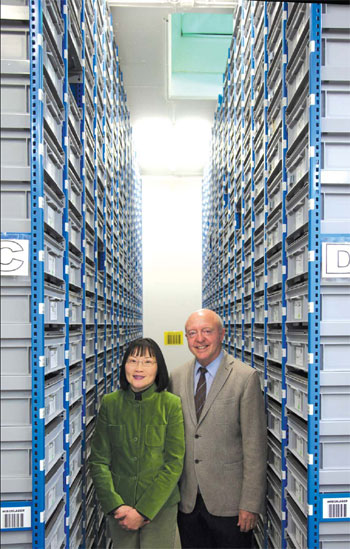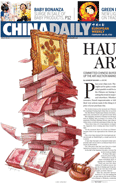Breaking tradition
Updated: 2011-02-18 10:18
By Fu Jing (China Daily European Weekly)
Amy Wu and Hans Boller were successful in lobbying the
Ambitious couple set up largest chain of TCM clinics throughout Switzerland

Swiss government to recognize TCM on par with Western
medicine. Provided to China Daily
When Amy Wu was a college student studying in Britain she invited a classmate to a remote cemetery to hunt for ghosts. It was just for a joke but after a long wait in the eerie darkness her male friend was trembling while she could see the funny side.
In her later years Wu enjoyed traveling to the remotest places on Earth to seek adventure and take the path less trodden.
"This is me, I like challenging situations," says Wu, who with her husband Hans Boller, founded ChinaMed Group, the leading Chinese healthcare company in Switzerland and one of the biggest in Europe.
Wu says she needed courage and a spirit of adventure to spread the Traditional Chinese Medicine (TCM) message in Europe because in 1997, when the couple set up their first clinic, there was strong skepticism toward the practice.
For a long time, TCM was not officially recognized by the state but in 2009 the Swiss people voted in favor of a constitutional article for complementary medicine.
More than 67 percent of voters supported TCM and Switzerland became the first country in Europe to set out in its constitution authority for the state to take complementary medicine into consideration in the public health service.
Now, private insurance companies have set up policies covering TCM and are proving popular.
Wu says public acceptance of TCM was vital and she lobbied aggressively to prove the benefits and legitimacy of Chinese medicine.
"This is a hard-won success," Wu says.
Today the couple has set up 14 clinics across Switzerland and two leading Swiss hospitals have allowed them to open ChinaMed centers inside their hospital premises.
ChinaMed also operates a 1,000 square-meter factory and pharmacy near Zurich, which has become a major Chinese medicine provider in Europe.
Every day, nearly 300 prescriptions are emailed to the pharmacy and on average, ChinaMed doctors administrate nearly 100,000 treatments every year.
"We tried to consolidate the operation over the years while constantly improving quality," Boller says.
There are a few major reasons behind their success, the couple says. They have been persistent in spreading the idea of TCM, have employed experienced Chinese doctors and applied efficient Swiss management methods to their business.
Wu was born in 1952 into a well-educated family in Hong Kong and obtained her education in the US and Britain.
Born in 1947, Boller grew up in Switzerland and after completing his PhD studies at the University of Zurich in 1976, moved to China for two years to lecture at a Beijing-based university. He stayed as a China correspondent for several Swiss media companies until 1983.
The couple first met when Boller visited the US in the 1970s and they eventually got married in 1982.
Boller and Wu have traveled to nearly every province and autonomous regions in China and their wanderings made them even more fascinated about Chinese culture, especially TCM.
Wu says TCM theory is based on the Confucian and Daoism philosophies of balance and unity of opposites (yin and yang).
According to TCM, poor health is the result of imbalance between interconnected organ systems, with one organ weak or the other overexcited.
"This is the overarching theory and for years we have been promoting that TCM is an essential part of Chinese culture," Boller says.
"By introducing to the Swiss public TCM we make them a bit more familiar with China's cultural heritage. We consider this our bridge-building function."
The couple has 30 years experience in the field of Chinese medicine but Wu continues to update her knowledge by studying Chinese medicine and management in Chengdu in Southwest China and Nanjing in East China.
"I have been equipped to communicate effectively with our doctors, which is an essential advantage of our company," Wu says.
Wu is responsible for selecting qualified doctors in China and only chooses the most qualified and experienced practitioners with a minimum of 10 years hospital duty.
To date, more than 200 Chinese doctors have been recruited.
Li Pengyao is the latest doctor recruited by ChinaMed Group and comes from a family, which boasts a long generation of TCM doctors.
He arrived in Zurich just one week ago.
Li works with a translator when he receives patients at the ChinaMed clinic, which is made up of Chinese doctors, translators, a receptionist, and a manager.
"The role of the translator is vital as she is building trust between the patients and me," Li says.
Li is surprised that TCM is so popular in Switzerland and since his arrival he has conducted about 10 treatments every day.
Wu says a TCM doctor is guided by four classic diagnostic methods that have been in use for thousands of years.
The procedures include observing the patient's expression, color, appearance and tongue; listening to the patient; feeling the pulse to find out its quality, power, rate and rhythm, and inspecting the body for any abnormality.
Data received from these procedures helps a doctor work out therapeutic remedies, such as acupuncture, herbal medicine, massage, dietary changes or other traditional techniques that could be used.
"Of course, a combination of these therapies is often used to effectively treat a patient," says Li,
However, all the clinics do not
prepare the herbal medication but just give prescriptions, which are emailed to their pharmacy near Zurich.
In the pharmacy, a specialized staff of 30 people, pack the medicines with the help of computerized system and then post them to the patients.
"Usually our patients can receive the medicine within 24 hours," Wu says.
"Our ideal is the combination of both medical traditions," they point out.
"This is a beginning that Chinese and Western doctors officially sit side by side to cure illness and save lives," says Wu. "We are delighted to see that."
E-paper

Online shops boom in China
Low investment, quick returns offer profit-making opportunities for struggling students.
Something 'fishy' about this trick
Banking on success
Branded outlets move in
Specials

The green lantern
Environmental concerns are shedding new light on a colorful tradition

Inland interchange
Chongqing bets on its position as a hub for China's west.

Zooming in on Chinese skies
Helicopter companies ride on country's growing interest in luxury aviation.
